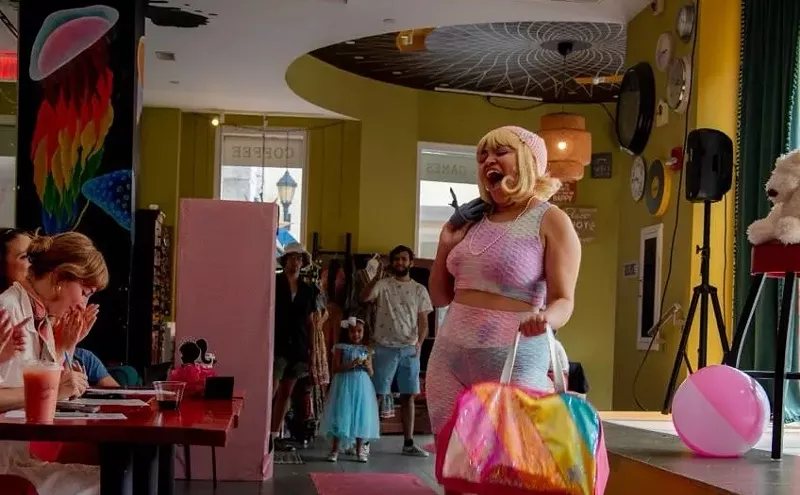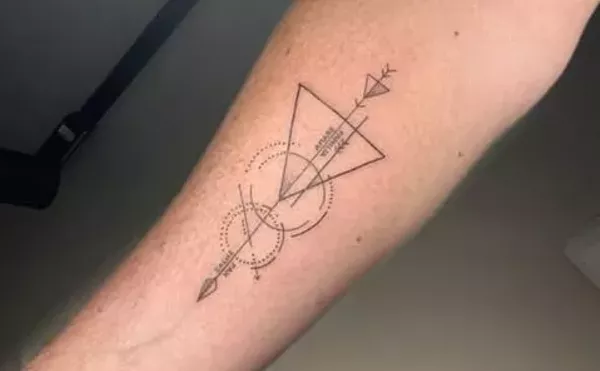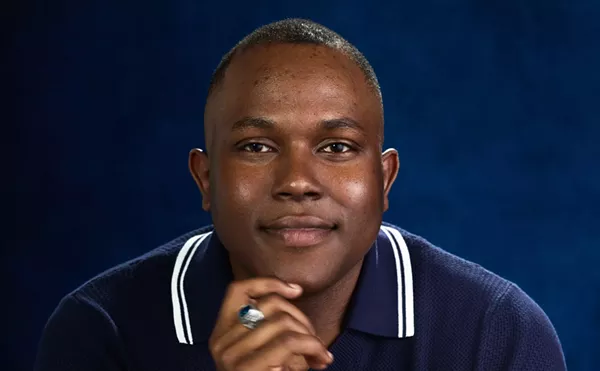Though he is working with drama on a very pure level in his feature debut, filmmaker Peter Sattler admits there are some surreal aspects to his movie, Camp X-Ray. "It had a very universal message of just finding commonality in a stranger that transcends language and cultural barriers," says the director from his hotel room at the Hyatt Regency in Coral Gables.
It takes place in Guantanamo Bay, where a fresh new army private comes face-to-face with detainees allegedly connected to the attacks on Sept. 11. Kristen Stewart plays Private Cole who connects with Ali Amir played by noted Iranian actor Peyman Moaadi, who burst onto the scene starring in the Oscar-winning movie A Separation, in 2011. The relationship, though impeded by all sorts of strict rules and barriers, creeps up on the viewer both through Sattler's patient but precise screenplay and the acting of the two leads.
Cultist asked Sattler about why he chose to set his first film in Gitmo and about the film's other surreal aspect: the underrated acting chops of Stewart.
See also: Kristen Stewart Isn't Bad Taking on Gitmo in Camp X-Ray
New Times: What was the inspiration for the film, your first feature? It's an interesting subject as such.
Peter Sattler: I spent maybe five or eight years doing writing-for-hire out in Hollywood, adapting stuff and doing re-writes and stuff like that, but I was always looking for a smart, kind of low budget first feature that also had something big to it. You know, you have to do it cheap but it also has to be big, too. One thing I'm always drawn to as a filmmaker is relatable, ordinary situations that are wrapped up in extraordinary environments, and I was watching a documentary, and I thought, Guantanomo Bay, this is interesting. This isn't how I thought it was.
Then I did more research, and it dawned on me that there's a very interesting dramatic relationship there between a guard and a detainee who are both stuck there and who had nothing else to do but talk to each other. In that instant, it was just a simple interaction, just two people in one room, but it was so much more heightened than that. It had all these external pressures swirling around it, so to me, that's when I really got obsessed with the idea and knew that I wanted to make it my first feature film, and it also touched a lot on the themes and things I'm interested in as an artist.
Have you heard criticism that you are too sympathetic to the detainees?
I'm sure some people will say that, but it's probably people who haven't seen the film. When you see the film, we try to show everybody in the movie as a good guy and a bad guy. We see some guards that are not nice. We show some guards that are nice. We show some detainees that are not nice. We show some detainees that are nice. My goal with the film was to show everybody not as a good guy or as a bad guy but as something more complicated and more nuanced and more real than that.
That being said, some people are never going to be happy with the idea of looking at a detainee as a human being and trying to understand them. You know, that's part of what I'm trying to do with the film, is to say, look, no matter what these guys did or didn't do, [if] we hope to -- in any way -- try to kind of manage the situation we have to start by just understanding who these people are. You can't just look at a detainee as a monster. That's not gonna get you anywhere. Really, the harder question to ask yourself is what makes a terrorist? What drives someone to do dome unspeakable act of horror? And from a purely pragmatic point of view, there's value in asking that question because if you ever hope to stop terrorism, you need to understand why terrorists are being made.
At the start of the film, the corporal tells the fresh recruits "Don't let them get into your head." It brings home the point that the camp is a kind of battle ground, doesn't it?
It is a war zone, but it's such a strange and surreal war zone. That was part of what I was really intrigued with when I started doing this research, as I said, when I thought maybe I could make a movie about this place, and I love it because it's a war, but it's such a game of inches. A victory is determined by whether or not you can throw a bottle of water at someone or whether or not you can take away a detainee's books or shampoo. It's surreal that the frontline of the war on terror is being played out on such a mundane and simple way.
I've always thought Kristen Stewart as a terrific actress. You reached out to her for this role, right?
We did. We took a Hail Mary, and one of my executive producers was able to get it to her agent and amazingly, she wanted to be a part of the film. The reason I got kinda of obsessed with Kristen, once I allowed myself to imagine that she could potentially be interested in doing it, is because she has the perfect mixture of a very tough exterior but then soft, kinda chewy inside. You see that she's got an edge to her. She's a feisty girl, but you can see how, yeah, she would be a soldier. She could hold her own with these other people in her squad, but at the end of the day, you can feel, seeping out of that, kind of this residual emotion, and that very vulnerable side of her seeps through the cracks, and to me that's the perfect mixture that the character of Private Cole really needed.
I totally saw that. She really comes across as a hard person while slowly melting toward a truly sympathetic human being at the end.
Yeah, yeah. It's about stripping away those layers and the things that kind of make her character uncomfortable. It's like a character that's not comfortable in their own skin, which is why it's so satisfying for her to put on this "costume" of a soldier because she can just kinda pretend to be this soldier and not really get into that hurt and vulnerable part of herself. That's really what the movie, towards the end, is about. It's about opening up, and that takes courage. As we say in the tagline, "Connection takes courage."
I think sometimes she gets a bad rap. I've totally believed her as an actress.
Yeah, it's an interesting phenomenon, the phenomenon of Kristen Stewart, not just as a person or as an actress. It's a very unusual thing, and I've never really understood it. Like, I remember before the movie came out, a lot of people were like really shocked that she was gonna play a character in a film like this. I never understood it because she's been doing these really interesting films for her whole career. I think the problem is that there is a small percentage of people out there who only know her from Twilight. That's one series of films in an otherwise rather large body of work that has pretty interesting dynamics. It has The Runaways to comedy, like Adventureland, so it's interesting. You know what the great thing is though, now? It's really cool that the conversation around her is changing and everyone's really starting to talk about her in a much different light, and I feel really honored to have been a part of this kind of new wave of Kristen Stewart's career.
Camp X-Ray opens exclusively in South Florida at the Coral Gables Art Cinema today. There will be a red carpet premiere with director Peter Sattler at 7 p.m. who will introduce the film and entertain a Q&A after the screening, which begins at 8 p.m. There will also be drink and food. Visit gablescinema.com.
Follow Hans Morgenstern on Twitter @HansMorgenstern.
Follow Cultist on Facebook and Twitter @CultistMiami.












